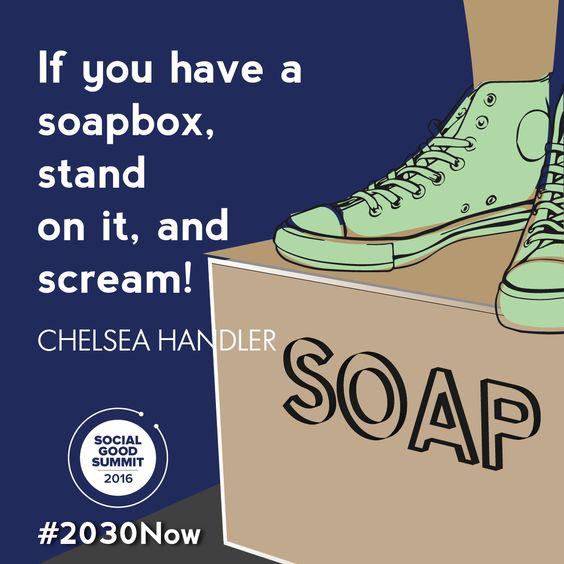Stand On It and Scream!
Events around momentous issues and broad humanitarian agendas are rather good at peppering celebrities throughout their line-up that have tied their image to these issues. One has to look no further than stars like Emma Watson, George & Amal Clooney, Leonardo DiCaprio, Angelina Jolie, and so forth just to get a sense of some of these individuals. In fact, this sort of presence can even be expected at such events. Yet, when I read that Chelsea Handler was going to be at the Social Good Summit I was a little caught off guard. (No disrespect, Chelsea!)
While not having followed much of Ms. Handler’s work, I always knew her as a comedian: unfiltered, successful, and unapologetic. Though I had never once associated her with a particular social issues or agenda. I began to think carefully about what she was going to say, what her presence would represent even. I found myself asking, “Why her?” And then it dawned on me. I was asking myself perhaps the same question that officials, adults, and a whole slew of people ask themselves when thinking about this space – spaces that discuss issues, solutions, initiatives and policy – a question that, while not without its logic, is flawed. This logic of “Why them?” is precisely what creates barriers to access and engagement. I soon corrected myself and realized we – I – needed a change of perspective.
Indeed, Ms. Handler’s presence at the Social Good Summit served as just that – a change in perspective – she democratized the conversation, illustrating in an effortless, unabashed fashion as only Chelsea Handler could, that someone does not need credentials or titles, wealth or a particular set of knowledge, to be a part of the discussion or movement. She illuminated the way in which these issues, the global agenda encapsulated in #2030NOW and the Sustainable Development Goals (SDGs), are not issues that belong to a particular set of people. The Sustainable Development Goals are our goals. Whether directly or indirectly, they affect us, they speak to us, and by addressing the tears and tarnishes in the fabric of society and they are the solution to procuring the advancement of all of us.
Perhaps the strongest line from Ms. Handler’s interview was her forceful call to action as she claimed, “If you have a soapbox, stand on it and scream!” This had come right after Ms. Handler had noted not only her own reservations about the political climate and certain issues, but also spoke about how she acknowledges her own strengths and plays to them. It got me thinking, we each have our own soapbox: our own issue that based on the way our lives have played out have become more intimate to us. Yet at times there are forces that try to diminish us, that give us reservations, that tell us it is not our time, or tell us our voices are not enough. That is not true. Each and every one of our voices is important. Our voices, collectively, are the key to realizing the global agenda. Our collective voices assure that no one will be left out, that our progress will not only be hard fought, but hard won. That being said, get on your soapbox and do not let anyone bring you down. And just as Ms. Handler suggested, sometimes you have to scream to be heard. If history has taught us something it is that change is not a passive process. Change does not come easy. Change demands conviction, tenacity and hard work. The SDGs show us that change is possible and there is a plan to bring it into fruition, now it is up to us – all of us – to make our voices heard in building partnerships, highlighting issues and disparities, educating people and holding officials and institutions accountable.
This particular call to action, one as firm and as bold, comes at an important time. We, as a global society, stand at a defining moment where we can either materialize our vision of peace, justice, and the advancement of the human condition; or we can stand idle as forces like climate change and human rights abuses threaten our very livelihood. But we can only avoid the latter if there is collective action, where all members of civil society come together; where those that have a voice, a platform, a soapbox make their voice heard and spread this call to action, educate and empower. So, by all means, “stand on it and scream.”




